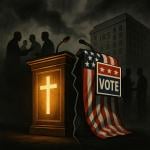ERIC PONDERS:
[After attending Protestant funerals] it has struck me how conflicted rituals are with regard to whether resurrection awaits the end of time or occurs immediately. Every service has involved phrases in the ritual saying both things — and they are in conflict.
THE GUY SAYS:
Christian churches disagree on many things, including details of Jesus’ Second Coming and the End Times, and there’s ample mystery about the afterlife. Yet regardless of what a particular funeral might suggest, there’s unusual consensus regarding what happens after death.
To start with Protestants, the Presbyterians are perhaps the ablest at precisely spelling out such matters. (Is that because John Calvin was a lawyer?) Their classic Westminster Confession of Faith was written by theologians and approved by Parliament in 1648 — a politically fascinating church situation that The Guy will leave aside. The pertinent chapter is titled “Of the State of Man After Death, and of the Resurrection of the Dead.”
The confession states that upon death believers’ bodies “return to dust, and see corruption,” while their “immortal” souls are “immediately … received into the highest heavens, where they behold the face of God in light and glory, waiting for the full redemption of their bodies” while (yes) “the souls of the wicked are cast into hell.” Then “at the last day” believers who are alive will “be changed” and “all the dead shall be raised up with the self-same bodies.” These bodies “shall be united again to their souls forever” but will have “different qualities … made conformable to [Jesus Christ’s] own glorious body” as described in the New Testament following his resurrection.
Most Protestant churches uphold variants of this scenario, in line with Paul’s biblical expectation often recited at funerals: “to be absent from the body and to be present with the Lord” (2 Corinthians 5:8). Speaking of Scripture, Westminster’s footnotes cite these 14 passages in support: Genesis 3:19, Luke 16:23-4 and 23:43, John 5:28-9, Acts 13:36 and 24:15, Romans 8:23, 1 Corinthians 15:42-4 and 51-2, 2 Corinthians 5:6-8, Philippians 1:23 and 3:21, 1 Thessalonians 4:17, and 2 Peter 2:9.
The contemporary Catholic catechism says the same more simply: “In death, the separation of the soul from the body, the human body decays and the soul goes to meet God, while awaiting its reunion with its glorified body. God, in his almighty power, will definitively grant incorruptible life to our bodies by reuniting them with our souls, through the power of Jesus’ resurrection” at “the last day.” The catechism adds with humility that how this all occurs “exceeds our imagination and understanding; it is accessible only to faith.”
Eastern Orthodoxy agrees on the central tenet of future resurrection reuniting the body and soul of believers, but is less precise about what comes before. A widely used French catechism (English version: “The Living God”) asks, “What about the dead who await the resurrection?” Answer: “We don’t know what waiting means for those who are outside the realm of space and time.” However, “at the Liturgy the dead are present, together with the saints and heavenly powers,” and living believers “pray for them and with them.” Thus there’s some state of conscious reality while awaiting the bodily resurrection.
Alongside this broad ecumenical harmony there’s disagreement about Purgatory. The Catholic catechism teaches that “all who die in God’s grace and friendship” are assured of eternal salvation, “but after death they undergo purification, so as to achieve the holiness necessary to enter the joy of heaven.” This temporary state “is entirely different from the punishment of the damned.” The church formulated the Purgatory doctrine at the Councils of Florence (1431-9) and Trent (1545-63).
The Westminster Confession says that besides heaven and hell as the places “for souls separated from their bodies, the Scripture acknowledgeth none.” More harshly, Swiss Calvinism’s Second Helvetic Confession, written a century before Westminster while Trent was in session, declares that the New Testament forbids any belief in Purgatory. In theory an individual could speculate about some intermediate spiritual state in the hereafter, but because the Bible is silent about this the Protestant “Scripture alone” principle means churches don’t teach such a concept. Eastern Orthodoxy likewise has no defined doctrine of Purgatory.
Meanwhile, a very different concept known colloquially as “soul sleep” is taught by the Seventh-day Adventist Church. Its Fundamental Beliefs state that “God, who alone is immortal, will grant eternal life to His redeemed. Until that day death is an unconscious state for all people.” This text also teaches what’s called annihilationism instead of eternity in hell: When the “unrighteous dead” are resurrected, “fire from God will consume them and cleanse the earth” so ultimately the universe is “freed of sin and sinners forever.”












